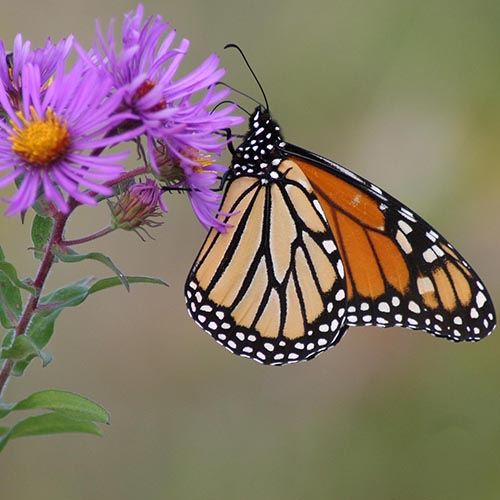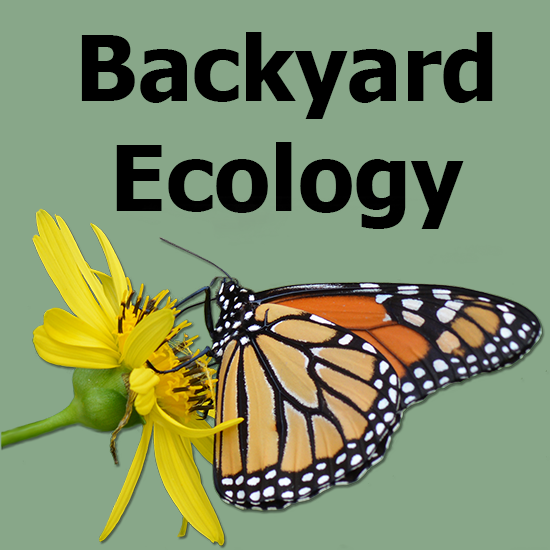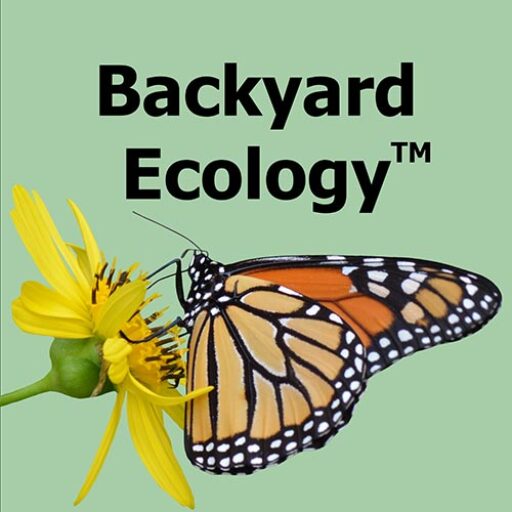
Listen to this Episode:
- From this webpage:
- Find the media player located under the episode picture.
- Click on the green triangle to listen to the audio for this episode.
- From your favorite podcast listening platform:
- Search for “Backyard Ecology.”
Show notes:
When it comes to gardening for monarchs, the most common thing you hear is “plant milkweeds.” Milkweeds are important, because they are the only thing that monarch caterpillars can eat. But they aren’t the whole story. In fact, having other types of flowering plants available can actually make your gardens more attractive to monarchs according to recent research from the University of Florida.
In this episode of the Backyard Ecology podcast, we talk with Rebecca Nestle. Rebecca recently completed her Master’s degree at the University of Florida where she explored several different topics related to gardening for monarchs.
Part of Rebecca’s research looked at how many eggs monarchs laid on focal milkweed plants in gardens composed only of milkweeds compared to gardens with several species that bloomed throughout the growing season. She also dove into another topic that relates to concerns we both often hear about monarch predators. In this part of her study, she compared the number of “natural enemies” (parasitoids and predators of monarchs) in mixed-species gardens compared to milkweed-only gardens. She then compared how well monarch caterpillars survived in each of those situations. Her results for all three of these studies were both surprising and exciting.
Another part of Rebecca’s research that we discussed related to the effects of high nitrogen levels on swamp milkweeds (Asclepias incarnata). She again, conducted a study that compared monoculture stands of swamp milkweed and swamp milkweeds intermixed with other species. She then looked at the impacts of these treatments on monarch caterpillars. Once again, the results were a little surprising, and potentially a little comforting for people gardening for monarchs in urban environments, near golf courses, or in other heavily fertilized locations.
Links
- Articles about Rebecca’s Research
- Study: For monarch butterflies, plant variety is the spice of life – http://blogs.ifas.ufl.edu/news/2020/10/15/study-for-monarch-butterflies-plant-variety-is-the-spice-of-life/
- Mixed-Species Gardens Increase Monarch Oviposition without Increasing Top-Down Predation – https://www.mdpi.com/2075-4450/11/9/648/htm
- Rebecca’s Thesis
- Investigating the Effects of Plant Diversity and Nutrients on Drivers of Monarch Fitness and Abundance – https://ufdc.ufl.edu/UFE0056937/00001
- Backyard Ecology’s website – https://backyardecology.net
- Backyard Ecology blog – https://www.backyardecology.net/blog/
- Backyard Ecology’s Patreon page – https://www.patreon.com/backyardecology
- Subscribe to Backyard Ecology emails – https://www.backyardecology.net/subscribe/
- My email: shannon@backyardecology.net
Episode image:
- Monarch butterfly nectaring on a New England aster
- Photo credit: USFWS Northeast Region, public domain

Backyard Ecology: Exploring Nature in Your Backyard
Nature isn’t just “out there.” It’s all around us, including right outside our doors. Hi, my name is Shannon Trimboli, and I am the host of Backyard Ecology. I live in southcentral Kentucky and am a wildlife biologist, educator, author, beekeeper, and owner of a nursery specializing in plants for pollinators and wildlife conservation. I invite you to join me as we ignite our curiosity and natural wonder, explore our yards and communities, and improve our local pollinator and wildlife habitat. Learn more or subscribe to my email list at www.backyardecology.net.

Leave a Reply